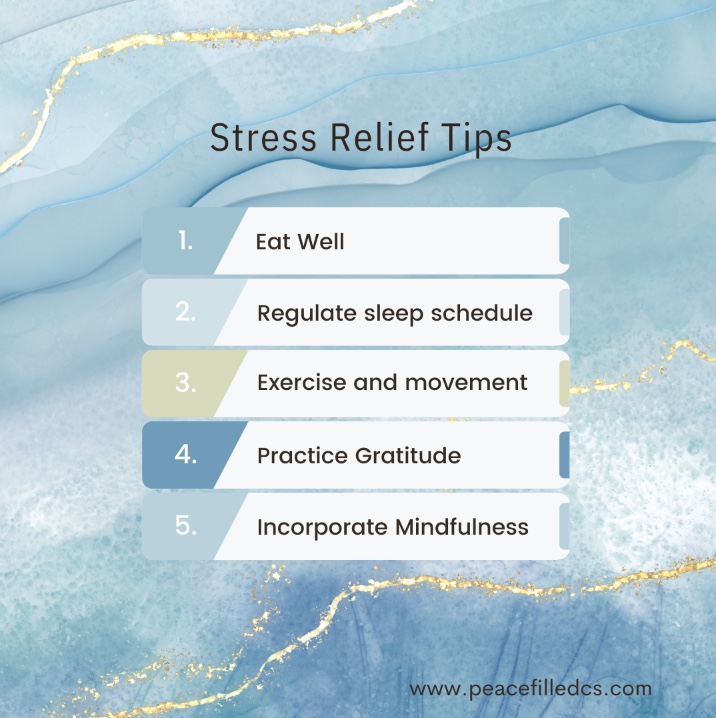While we focused on some short-term, stress relief strategies for your coping skills toolbox last month, as we work our way into the new year, we’re sharing some reminders of how to regulate stress from a routine, habit-forming, long-term relief level.
Sometimes these principles are brought into our lives when all is “going well” and the sneaky thing about stress is that it builds, so to tell ourselves to implement these “long-term stress relief” strategies when we’re already overwhelmed may seem – well, more overwhelming. That’s sometimes why we like reaching out with these blogs, while it’s not a “fix” it’s a reminder, that along with other stress management strategies, such as short-term relief and self-care, reaching out to your support systems and using coping skills that are individual to you, reaching out to mental, physical and overall health providers for support, and bringing in some of these long-term stress strategies, the goal is to have the cycle of stress you may experience, be more manageable during difficult times, and for the different elements of stress management to kick in when they’re in need.
Long-Term Stress Relief Pointers

- Eating well
- When we’re overwhelmed, there may not seem to be enough time, or resources to eat a healthy meal and keep a well-balanced diet. It might also be a comfort to reach for foods that are high in preservatives and fast-food. This is a reminder that finding ways to regularly eat well will have positive effects on your overall physical and mental health. This means that while it’s okay to not rigidly follow a meal plan, working on making healthy food incorporations into your daily routine, even if it’s during snacks or one meal, will make a difference. When you’re falling away from healthy well-balanced meals, what are some meals, routines or reminders that “bring you back” to the healthy eating mindset?
- Regular Sleep Schedule
- We noticed that many of the long-term stress pointers are some of our previous blog topics, and that’s because these are the tools that are available to each of us, but may not be the easiest to regulate consistently. What we invite is for each of us to reflect on how we improve and add more to our “habit cup” and the systems that work for each person individually. Sometimes it’s working through some other symptoms and with a therapist and other healthcare professionals, to remove as many blockers as possible, and sometimes it’s reflecting on the work you’ve already done, or checking in to see if life has changed in a way that’s affecting some of these key de-stressors. So from time to time, we ask you, how has your sleep been lately? What are ways to remember to ask yourself? What are ways to improve your sleep hygiene even a little more this week? Are you snoozing pretty well more days than not? Wonderful!
- Exercise
- We use exercise and movement interchangeably, and like all the rest of our long term stress- busting tips, we want to remind you that these are not a one-size fit all guide, and more so, a friendly reminder that if you are able to add more of any of these stress relieves to your day-to-day, then let’s do it! Exercise from stretching, breathing, to running and sports all bring a slew of feel-good properties and stress regulation. We are here to remind that adding a stretch and breath break into your day for a few weeks in a row, would build overtime. Feeling creative? What are things you are already going in life that would be more fun with a little bit of added breath work or stretching.
- Practice Gratitude and Incorporating Mindfulness
- Both of these ideas are in the space of centering ourselves in the present moment. If we’re able to see what we have and also be grounded in the here and now, we’ll have more opportunities to invite the work our parasympathetic nervous system is programed to do. With practice, when we’re feeling stressed, our bodies will feel pulled to regulate and instead of automatic stress and anxiety, tension and disappointment, we may overtime build towards more awareness of what we have and what works. This sounds easier said than done, and it may not be easy to find the mindfulness activity that works for you alone. Sometimes it’s trying different grounding techniques, self-reflection exercises, and communication styles to begin to feel more aware of ourselves. This may be easier to incorporate after having worked through some more difficult symptoms and life circumstances with the help of a support system, or mental health professional, though beginning exercises in mindfulness, gratitude, and self-love will continue to bring in long term stress relief as it becomes more of a daily practice.
Like some of our other blog posts, this is not an exhaustive list of long-term stress relief strategies! It may not even seem novel to you. We’re here to share these as a reminder, as we all get into moments where we forget to incorporate these long-term wellness aids. If many of these areas seem too far out of reach, that may also be a signal to us that more support may be needed. In times like those, it may be reflecting on those in your support system that you may turn to, or reaching out to work with a therapist.
Reach out if you or someone you know may need someone to talk to during the holidays or into the new year. Book a free consultation here.


0 Comments